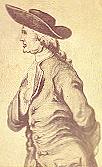Henry Cavendish
|
|
Henry Cavendish (October 10, 1731 - February 24, 1810) was a British scientist.
The grandson of the Second Duke of Devonshire, he attended Cambridge from 1749 to 1753 but left without taking a degree. He inherited a large fortune which enabled him to pursue his scientific studies, most of which remained unpublished during his lifetime.
He is generally credited with having discovered hydrogen, since he had described the density of 'inflammable air', which formed water on combustion, in a paper "On Factitious Airs" that appeared in 1766. Antoine Lavoisier later reproduced his experiment and gave the element its name.
Cavendish is also credited with one of the earliest accurate calculations of the mass of the earth. He used a torsion balance to measure the gravitational attraction between lead spheres in 1798, from which he calculated Newton's gravitational constant, G, which he used to calculate the earth's mass. His results remained the accepted standard until the 20th century. The current best estimate for the Earth's mass is 5.9725 billion trillion tonnes, a difference of only about 1 per cent from Cavendish's finding.
Additionally, Cavendish established an accurate composition of the atomosphere. He found that 79.167 % is "phlogisticated" air (now nitrogen + argon) and 20.833 % is "dephlogisticated" air (now known to be 20.95% oxygen). He also found that 1/120 is a third gas (William Ramsay and Lord Rayleigh established the gas to be argon 100 years later).
He was silent and solitary, viewed as somewhat eccentric, and formed no close personal relationships outside his family. By one account, Cavendish had a back staircase added to his house in order to avoid encountering his housekeeper because he was especially shy of women. The contemporary accounts of his personality have led modern commentators to speculate that he had Asperger's syndrome.
Because of his anti-social and secretive behaviour, he often avoided publishing his work, and much of his findings were not even told to his fellow scientists. It wasn't until the late nineteenth century, after his death, that James Clerk Maxwell looked through his papers. He found that credit to most of his discoveries had already been given to others. Examples of what was included in Cavendish's discoveries or anticipations were Richter's Law of Reciprocal Proportions, Ohm's Law, Dalton's Law of Partial Pressures, principles of electrical conductivity and Charles's Law of Gases.
He left a large estate on his death which was used to endow the Cavendish Laboratory at Cambridge University in 1871.de:Henry Cavendish es:Henry Cavendish fr:Henry Cavendish gd:Henry Cavendish is:Henry Cavendish it:Henry Cavendish he:הנרי קבנדיש nl:Henry Cavendish ja:ヘンリー・キャヴェンディッシュ pl:Henry Cavendish pt:Henry Cavendish ro:Henry Cavendish ru:Кавендиш, Генри sl:Henry Cavendish

